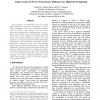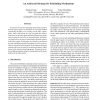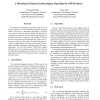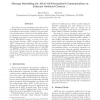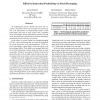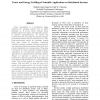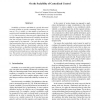108
click to vote
IPPS
2005
IEEE
15 years 7 months ago
2005
IEEE
Recently, energy has become an important issue in highperformance computing. For example, supercomputers that have energy in mind, such as BlueGene/L, have been built; the idea is...
123
click to vote
IPPS
2005
IEEE
15 years 7 months ago
2005
IEEE
Left unchecked, the fundamental drive to increase peak performance using tens of thousands of power hungry components will lead to intolerable operating costs and failure rates. R...
105
click to vote
IPPS
2005
IEEE
15 years 7 months ago
2005
IEEE
Previous work on task scheduling mechanisms assumed that the agent’s goal is to maximize its own profit without considering the effect of its strategy on the other agents’ pr...
102
click to vote
IPPS
2005
IEEE
15 years 7 months ago
2005
IEEE
The Chained Lin-Kernighan algorithm (CLK) is one of the best heuristics to solve Traveling Salesman Problems (TSP). In this paper a distributed algorithm is proposed, were nodes i...
110
click to vote
IPPS
2005
IEEE
15 years 7 months ago
2005
IEEE
Modern internet and telephone switches consist of numerous VLSI-circuits operating at high frequencies to handle high bandwidths. It is beyond question that such systems must cont...
114
click to vote
IPPS
2005
IEEE
15 years 7 months ago
2005
IEEE
We develop a message scheduling scheme that can theoretically achieve the maximum throughput for all–to–all personalized communication (AAPC) on any given Ethernet switched cl...
138
Voted
IPPS
2005
IEEE
15 years 7 months ago
2005
IEEE
Buffered CoScheduled (BCS) MPI is a novel implementation of MPI based on global synchronization of all system activities. BCS-MPI imposes a model where all processes and their com...
117
click to vote
IPPS
2005
IEEE
15 years 7 months ago
2005
IEEE
As technological process shrinks and clock rate increases, instruction caches can no longer be accessed in one cycle. Alternatives are implementing smaller caches (with higher mis...
124
click to vote
IPPS
2005
IEEE
15 years 7 months ago
2005
IEEE
Power consumption is a troublesome design constraint for emergent systems such as IBM’s BlueGene /L. If current trends continue, future petaflop systems will require 100 megawat...
103
click to vote
IPPS
2005
IEEE
15 years 7 months ago
2005
IEEE
Scalability of clusters and MPPs is typically discussed in terms of limits on growth: something which grows at a rate of O(log p) (where p is the number of processors) is said to ...

